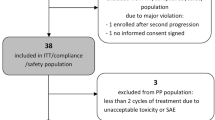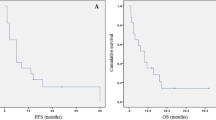Opinion Statement
At the time of glioblastoma (GBM) recurrence, a sharp analysis of prognostic factors, disease characteristics, response to adjuvant treatment, and clinical conditions should be performed. A prognostic assessment could allow a careful selection between patients that could be proposed to intensified approaches or palliative setting. Participation in clinical trials aims to improve outcome, and should be encouraged due to dismal prognosis of GBM patients after recurrence. Reoperation should be proposed if the tumor is amenable to a complete resection and if prognostic factors suggest that patient could benefit from a second surgery. Second-line chemotherapy should be chosen based on MGMT status, time to disease recurrence, and toxicity profile. If enrollment into a clinical trial is not possible, a nitrosourea-based regimen is the preferred choice, carefully evaluating any previous temozolomide (TMZ)-related toxicity. In MGMT-methylated patients relapsing after TMZ completion, a rechallenge could be proposed. After second progression, the clinical advantage of subsequent lines of chemotherapy still needs to be clarified. However, based on performance status, patients’ preference, and disease behavior, a third-line treatment could be considered. Available treatments include nitrosoureas, bevacizumab, or carboplatin plus etoposide. However, more effective therapeutic options are needed.
Similar content being viewed by others
References
Papers of particular interest, published recently, have been highlighted as: • Of importance •• Of major importance
Stupp R, Mason WP, van den Bent MJ, Weller M, Fisher B, Taphoorn MJ, et al. Radiotherapy plus concomitant and adjuvant temozolomide for glioblastoma. N Engl J Med. 2005;352(10):987–96.
Carson KA, Grossman SA, Fisher JD, Shaw EG. Prognostic factors for survival in adult patients with recurrent glioma enrolled onto the new approaches to brain tumor therapy CNS consortium phase I and II clinical trials. J Clin Oncol. 2007;25(18):2601–6.
Wu W, Lamborn KR, Buckner JC, Novotny PJ, Chang SM, O’Fallon JR, et al. Joint NCCTG and NABTC prognostic factors analysis for high-grade recurrent glioma. Neuro-Oncology. 2010;12(2):164–72. doi:10.1093/neuonc/nop019.
Gorlia T, Stupp R, Brandes AA, Rampling RR, Fumoleau P, Dittrich C, et al. New prognostic factors and calculators for outcome prediction in patients with recurrent glioblastoma: a pooled analysis of EORTC Brain Tumour Group phase I and II clinical trials. Eur J Cancer. 2012;48(8):1176–84. doi:10.1016/j.ejca.2012.02.004 .These three studies analized the role of prognostic factors in large series of GBM recurrent patients
Lacroix M, Abi-Said D, Fourney DR, Gokaslan ZL, Shi W, DeMonte F, et al. A multivariate analysis of 416 patients with glioblastoma multiforme: prognosis, extent of resection, and survival. J Neurosurg. 2001;95(2):190–8.
Sanai N, Polley MY, McDermott MW, Parsa AT, Berger MS. An extent of resection threshold for newly diagnosed glioblastomas. J Neurosurg. 2011;115(1):3–8. doi:10.3171/2011.2.JNS10998.
Chang SM, Parney IF, McDermott M, Barker 2nd FG, Schmidt MH, Huang W, et al. Perioperative complications and neurological outcomes of first and second craniotomies among patients enrolled in the Glioma Outcome Project. J Neurosurg. 2003;98(6):1175–81. doi:10.3171/jns.2003.98.6.1175.
Park JK, Hodges T, Arko L, Shen M, Dello Iacono D, McNabb A, et al. Scale to predict survival after surgery for recurrent glioblastoma multiforme. J Clin Oncol Off J Am Soc Clin Oncol. 2010;28(24):3838–43. doi:10.1200/JCO.2010.30.0582.
Park CK, Kim JH, Nam DH, Kim CY, Chung SB, Kim YH, et al. A practical scoring system to determine whether to proceed with surgical resection in recurrent glioblastoma. Neuro-Oncology. 2013;15(8):1096–101. doi:10.1093/neuonc/not069.
Nava F, Tramacere I, Fittipaldo A, Bruzzone MG, Dimeco F, Fariselli L, et al. Survival effect of first- and second-line treatments for patients with primary glioblastoma: a cohort study from a prospective registry, 1997-2010. Neuro-Oncology. 2014;16(5):719–27. doi:10.1093/neuonc/not316.
Brandes AA, Bartolotti M, Tosoni A, Poggi R, Bartolini S, Paccapelo A, et al. Patient outcomes following second surgery for recurrent glioblastoma. Future Oncol. 2016;12(8):1039–44. doi:10.2217/fon.16.9 .This study conducted in a large series of GBM patients reoperated at recurrence demonstrated that extent of resection and MGMT methylation status were correlated with survival
Ringel F, Pape H, Sabel M, Krex D, Bock HC, Misch M, et al. Clinical benefit from resection of recurrent glioblastomas: results of a multicenter study including 503 patients with recurrent glioblastomas undergoing surgical resection. Neuro-Oncology. 2016;18(1):96–104. doi:10.1093/neuonc/nov145.
Clarke JL, Ennis MM, Yung WK, Chang SM, Wen PY, Cloughesy TF, et al. Is surgery at progression a prognostic marker for improved 6-month progression-free survival or overall survival for patients with recurrent glioblastoma? Neuro-Oncology. 2011;13(10):1118–24. doi:10.1093/neuonc/nor110.
Hervey-Jumper SL, Berger MS. Reoperation for recurrent high-grade glioma: a current perspective of the literature. Neurosurgery. 2014;75(5):491–9 . doi:10.1227/NEU.0000000000000486.discussion 8-9
Suchorska B, Weller M, Tabatabai G, Senft C, Hau P, Sabel MC, et al. Complete resection of contrast-enhancing tumor volume is associated with improved survival in recurrent glioblastoma-results from the DIRECTOR trial. Neuro-Oncology. 2016;18(4):549–56. doi:10.1093/neuonc/nov326 .The study demonstrated that complete resection was associated with improved survival in GBM reoperated patients
Brandes AA, Bartolotti M, Tosoni A, Franceschi E. Nitrosoureas in the Management of Malignant Gliomas. Curr Neurol Neurosci Rep. 2016;16(2):13. doi:10.1007/s11910-015-0611-8.
Wick W, Puduvalli VK, Chamberlain MC, van den Bent MJ, Carpentier AF, Cher LM, et al. Phase III study of enzastaurin compared with lomustine in the treatment of recurrent intracranial glioblastoma. J Clin Oncol. 2010;28(7):1168–74. doi:10.1200/JCO.2009.23.2595.
Brandes AA, Carpentier AF, Kesari S, Sepulveda-Sanchez JM, Wheeler HR, Chinot O, et al. A phase II randomized study of galunisertib monotherapy or galunisertib plus lomustine compared with lomustine monotherapy in patients with recurrent glioblastoma. Neuro-Oncology. 2016. doi:10.1093/neuonc/now009.
Batchelor TT, Mulholland P, Neyns B, Nabors LB, Campone M, Wick A, et al. Phase III randomized trial comparing the efficacy of cediranib as monotherapy, and in combination with lomustine, versus lomustine alone in patients with recurrent glioblastoma. J Clin Oncol. 2013;31(26):3212–8. doi:10.1200/JCO.2012.47.2464.
Taal W, Oosterkamp HM, Walenkamp AM, Dubbink HJ, Beerepoot LV, Hanse MC, et al. Single-agent bevacizumab or lomustine versus a combination of bevacizumab plus lomustine in patients with recurrent glioblastoma (BELOB trial): a randomised controlled phase 2 trial. Lancet Oncol. 2014;15(9):943–53. doi:10.1016/S1470-2045(14)70314-6.
Brandes AA, Tosoni A, Franceschi E, Blatt V, Santoro A, Faedi M, et al. Fotemustine as second-line treatment for recurrent or progressive glioblastoma after concomitant and/or adjuvant temozolomide: a phase II trial of Gruppo Italiano Cooperativo di Neuro-Oncologia (GICNO). Cancer Chemother Pharmacol. 2009;64(4):769–75. doi:10.1007/s00280-009-0926-8.
Brandes AA, Finocchiaro G, Zagonel V, Reni M, Caserta C, Fabi A, et al. AVAREG: a phase 2, randomized, noncomparative study of fotemustine or bevacizumab for patients with recurrent glioblastoma. Neuro-Oncology. 2016. doi:10.1093/neuonc/now035.
van den Bent MJ, Taal W. Are we done with dose-intense temozolomide in recurrent glioblastoma? Neuro-Oncology. 2014;16(9):1161–3. doi:10.1093/neuonc/nou157 .This review evaluated the role of intensified temozolomide schedules in recurrent GBM
Weller M, Tabatabai G, Kastner B, Felsberg J, Steinbach JP, Wick A, et al. MGMT promoter methylation is a strong prognostic biomarker for benefit from dose-intensified temozolomide rechallenge in progressive glioblastoma: the DIRECTOR trial. Clin Cancer Res. 2015;21(9):2057–64. doi:10.1158/1078-0432.CCR-14-2737 .This study provides the evidence for temozolomide rechallange in MGMT methylated patients in recurrence after temozolomide interruption
Reardon DA, Wen PY, Mellinghoff IK. Targeted molecular therapies against epidermal growth factor receptor: past experiences and challenges. Neuro-Oncology. 2014;16(Suppl 8):viii7–13. doi:10.1093/neuonc/nou232.
van den Bent MJ, Brandes AA, Rampling R, Kouwenhoven MC, Kros JM, Carpentier AF, et al. Randomized phase II trial of erlotinib versus temozolomide or carmustine in recurrent glioblastoma: EORTC brain tumor group study 26034. J Clin Oncol. 2009;27(8):1268–74. doi:10.1200/JCO.2008.17.5984.
Vredenburgh JJ, Desjardins A, Herndon 2nd JE, Dowell JM, Reardon DA, Quinn JA, et al. Phase II trial of bevacizumab and irinotecan in recurrent malignant glioma. Clin Cancer Res. 2007;13(4):1253–9.
Vredenburgh JJ, Desjardins A, Herndon 2nd JE, Marcello J, Reardon DA, Quinn JA, et al. Bevacizumab plus irinotecan in recurrent glioblastoma multiforme. J Clin Oncol. 2007;25(30):4722–9. doi:10.1200/JCO.2007.12.2440.
Kreisl TN, Kim L, Moore K, Duic P, Royce C, Stroud I, et al. Phase II trial of single-agent bevacizumab followed by bevacizumab plus irinotecan at tumor progression in recurrent glioblastoma. J Clin Oncol. 2009;27(5):740–5.
Friedman HS, Prados MD, Wen PY, Mikkelsen T, Schiff D, Abrey LE, et al. Bevacizumab alone and in combination with irinotecan in recurrent glioblastoma. J Clin Oncol. 2009;27(28):4733–40. doi:10.1200/JCO.2008.19.8721.
Field KM, Jordan JT, Wen PY, Rosenthal MA, Reardon DA. Bevacizumab and glioblastoma: scientific review, newly reported updates, and ongoing controversies. Cancer. 2015;121(7):997–1007. doi:10.1002/cncr.28935.
Wick W, Brandes A, Gorlia T, Bendszus M, Sahm F, Taal W et al. Phase III trial exploring the combination of bevacizumab and lomustine in patients with first recurrence of glioblastoma: the EORTC 26101 trial. Neuro Oncol. 2015;(17). This phase III study randomized recurrent GBM patients to bevacizumab in combination with CCNU or CCNU alone demonstrating a significant increase in PFS not translating in a survival advantage.
Khasraw M, Ameratunga M, Grommes C. Bevacizumab for the treatment of high-grade glioma: an update after phase III trials. Expert Opin Biol Ther. 2014;14(5):729–40. doi:10.1517/14712598.2014.898060.
Lu-Emerson C, Duda DG, Emblem KE, Taylor JW, Gerstner ER, Loeffler JS, et al. Lessons from anti-vascular endothelial growth factor and anti-vascular endothelial growth factor receptor trials in patients with glioblastoma. J Clin Oncol. 2015;33(10):1197–213. doi:10.1200/JCO.2014.55.9575.
Piccioni DE, Lai A. Deferred use of bevacizumab for recurrent glioblastoma is not associated with diminished efficacy. Neuro-Oncology. 2014;16(10):1427–8. doi:10.1093/neuonc/nou214.
Levin VA, Mendelssohn ND, Chan J, Stovall MC, Peak SJ, Yee JL, et al. Impact of bevacizumab administered dose on overall survival of patients with progressive glioblastoma. J Neuro-Oncol. 2015;122(1):145–50. doi:10.1007/s11060-014-1693-x.
Wong ET, Gautam S, Malchow C, Lun M, Pan E, Brem S. Bevacizumab for recurrent glioblastoma multiforme: a meta-analysis. J Natl Compr Cancer Netw. 2011;9(4):403–7.
Franceschi E, Bartolotti M, Brandes AA. Bevacizumab in recurrent glioblastoma: open issues. Future Oncol. 2015;11.
Franceschi E, Brandes AA. The role of bevacizumab in recurrent glioblastoma: new insights from randomized trials. CNS Oncol. 2015;4(3):117–9. doi:10.2217/cns.15.7.
Sandmann T, Bourgon R, Garcia J, Li C, Cloughesy T, Chinot OL, et al. Patients with proneural glioblastoma may derive overall survival benefit from the addition of bevacizumab to first-line radiotherapy and temozolomide: retrospective analysis of the AVAglio trial. J Clin Oncol. 2015;33(25):2735–44. doi:10.1200/JCO.2015.61.5005.
Sulman EP, Won M, Blumenthal A, Vogelbaum M, Colman H, Jenkins RB et al. Molecular predictors of outcome and response to bevacizumab (BEV) based on analysis of RTOG 0825, a phase III randomized trial comparing chemoradiation with or without BEV in patients with newly diagnosed glioblastoma (GBM) J Clin Oncol. 2013;31:suppl;abstr.
Erdem-Eraslan L, van den Bent MJ, Hoogstrate Y, Naz-Khan H, Stubbs A, van der Spek P, et al. Identification of patients with recurrent glioblastoma who may benefit from combined bevacizumab and CCNU therapy: a report from the BELOB trial. Cancer Res. 2016;76(3):525–34. doi:10.1158/0008-5472.CAN-15-0776.
Fecci PE, Heimberger AB, Sampson JH. Immunotherapy for primary brain tumors: no longer a matter of privilege. Clin Cancer Res. 2014;20(22):5620–9. doi:10.1158/1078-0432.CCR-14-0832.
Sampson J, Vlahovic G, Sahebjam S, Omuro A, Baehring J, Hafler D, et al. Preliminary safety and activity of nivolumab and its combination with ipilimumab in recurrent glioblastoma (GBM): CHECKMATE-143. J Clin Oncol. 2015;33(No 15_suppl (May 20 Supplement)):3010.
Sampson JH, Mitchell DA. Vaccination strategies for neuro-oncology. Neuro-Oncology. 2015;17(Suppl 7):vii15–25. doi:10.1093/neuonc/nov159.
Reardon D, Desjardins A, Schuster J, Tran D, Fink KL, Nabors BL, et al. ReACT: long-term survival from a randomized phase ii study of rindopepimut (CDX-110) plus bevacizumab in relapsed glioblastoma. Neuro-Oncology. 2015;17:v107–12.
Crane CA, Han SJ, Ahn B, Oehlke J, Kivett V, Fedoroff A, et al. Individual patient-specific immunity against high-grade glioma after vaccination with autologous tumor derived peptides bound to the 96 KD chaperone protein. Clin Cancer Res. 2013;19(1):205–14. doi:10.1158/1078-0432.CCR-11-3358.
Bloch O, Parsa AT. Heat shock protein peptide complex-96 (HSPPC-96) vaccination for recurrent glioblastoma: a phase II, single arm trial. Neuro-Oncology. 2014;16(5):758–9. doi:10.1093/neuonc/nou054.
Tonder M, Weller M, Eisele G, Roth P. Carboplatin and etoposide in heavily pretreated patients with progressive high-grade glioma. Chemotherapy. 2014;60(5–6):375–8. doi:10.1159/000440678.
Author information
Authors and Affiliations
Corresponding author
Ethics declarations
Conflict of Interest
The authors declare that they have no conflict of interest.
Human and Animal Rights and Informed Consent
This article does not contain any studies with human or animal subjects performed by any of the authors.
Additional information
This article is part of the Topical Collection on Neuro-oncology
Rights and permissions
About this article
Cite this article
Tosoni, A., Franceschi, E., Poggi, R. et al. Relapsed Glioblastoma: Treatment Strategies for Initial and Subsequent Recurrences. Curr. Treat. Options in Oncol. 17, 49 (2016). https://doi.org/10.1007/s11864-016-0422-4
Published:
DOI: https://doi.org/10.1007/s11864-016-0422-4




